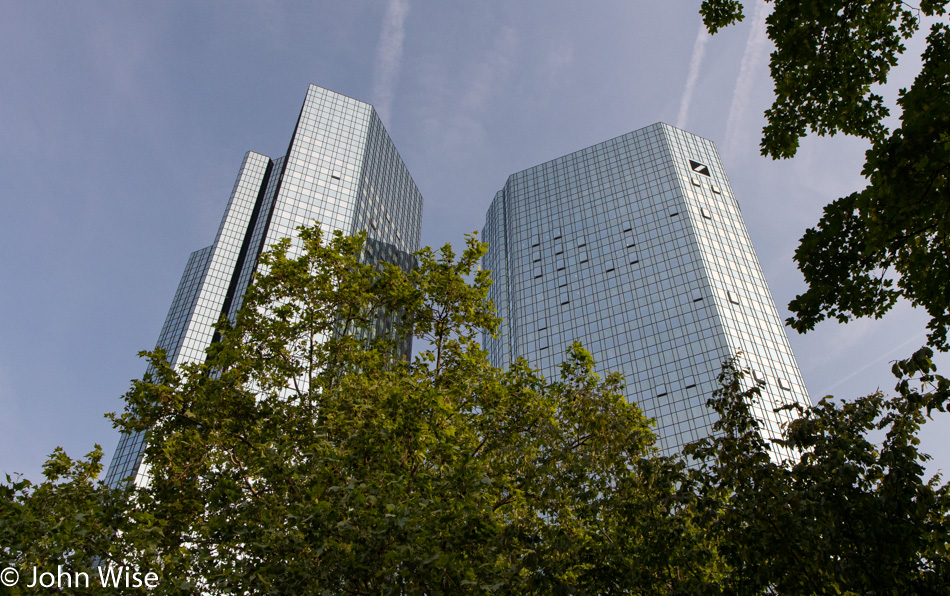
*** I’d like to take a moment to explain something regarding a conversation Caroline and I are having regarding these posts in Frankfurt. She feels that my socio-political-economic musings are interrupting the flow of the travel narrative and that maybe I should have carved out these diatribes into their own entries. The issue for me is that these intellectual situations were where I was in my head when we were on trains or sitting down for a coffee. The difference between this week in Frankfurt and the previous two weeks is that I was alone and had nothing to share about time spent with things or people that were familiar to me so it was all selfishly centered on whatever I wanted to rant or wax on about. Should you find these abrupt interludes jarring….well, too bad.
Frankfurt is the only city in Germany with a skyline dominated by highrises. It’s also the financial capital on the continent, and with London about to potentially exit the European Union via Brexit, Frankfurt only stands to win if England and the rest of the United Kingdom abandon the ship of integration. I won’t mince my words here; the utter stupidity of the old and undereducated that were exploited in order to kickstart the dismemberment of the EU is a kind of fuckery that only serves the xenophobic ambitions of powers afraid that their military superiority is going to be eclipsed by benevolent power that risks the hegemony of the West. If the United States, with the help of its long-term ally England, cracks the EU back into fractured powers, those entities will have to act as solo players and build alignments based on military commitments instead of America needing to find agreement from a bureaucratic EU that has to take into consideration social cohesion across the Union and find consensus on financial and military commitments.
If America believes there will be a clash of cultures and that a war on the scale that would be required to contain non-white players into a more historical subservient role that has been being played for the past 100 or so years comes to pass, it will be an extremely violent conflagration that will eclipse the level of destruction seen in all previous wars combined. In order to rationalize such a conflict, the United States will have to count the number of allies it has in recognizing the necessity of such action. By eliminating the EU, which would collectively be only a single ally, it would be able to align with governments moving to the right and maybe find 15 of the 27 current EU members to join its front. The appearance of having a dozen complicit aggressors instead of going it alone might nudge others on the fringe to back a coalition instead of risking isolation.
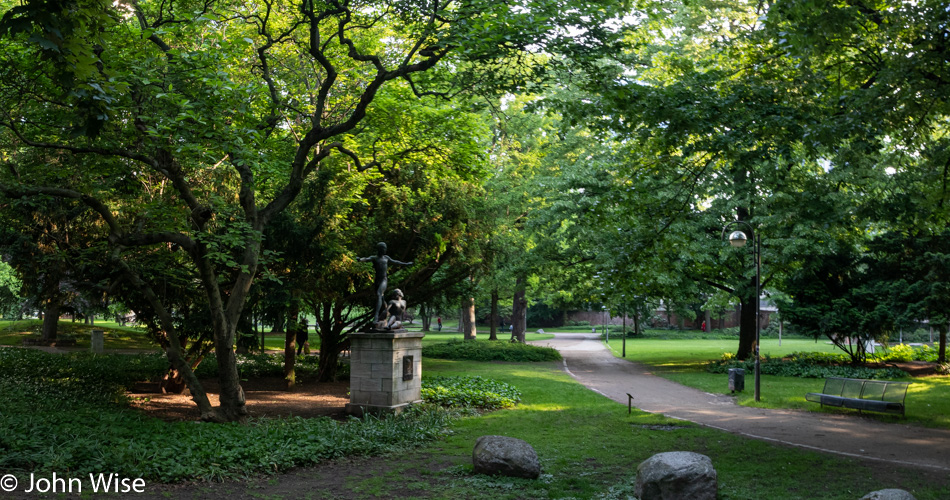
As I move through Germany on the eve of European elections while the American Right agitates and implicitly backs anti-immigration right-wing policies of intolerance with hostility towards open borders, I can’t help but focus much of my attention on the future of these lands that have avoided war for over 70 years.
The very idea that the West might contain Asia and freeze immigration from Latin America, Africa, and the Middle East by creating conditions that are absolutely detrimental to being from one of those land areas is going to sound very appealing to an electorate afraid of the influx of people “stealing” their jobs. If I think longer about the conditions that a conflict could play out, I can see a situation where America works in complicity with China. Matter of fact, when considering how China is currently trying to contain its Muslim Uighur population, I have to wonder if this is practice for what we as a society will have to start accepting as containment moves to a global scale.
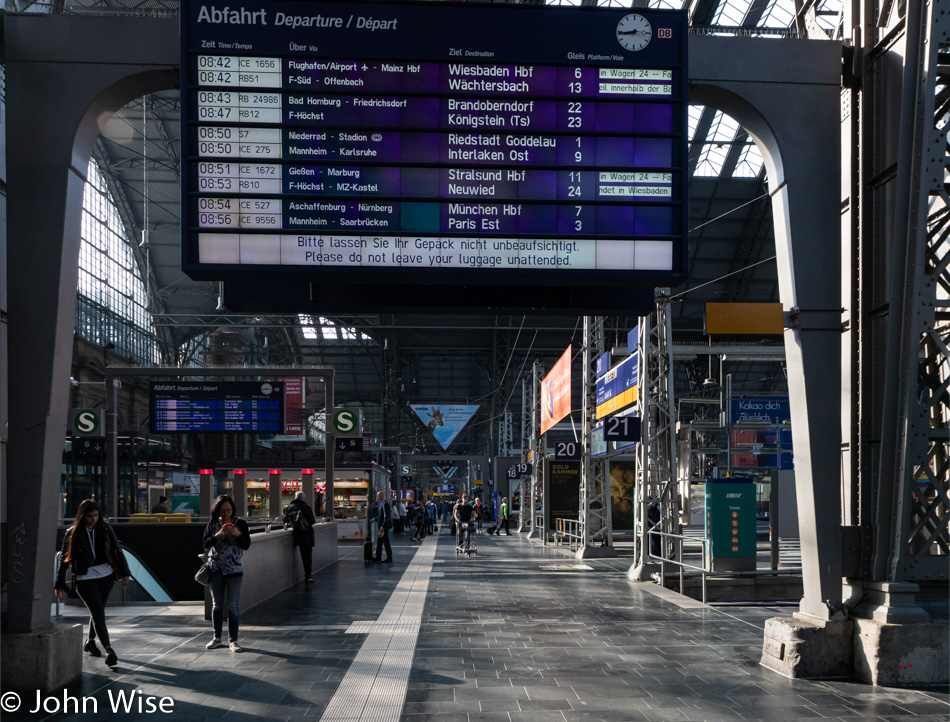
The trains, they go everywhere. The longer-distance trains have wifi. Most have plugs to charge mobile devices. There are helpers if you need assistance finding your seat. There are areas for bikes. Toilets are frequently larger than airplane facilities. With solid tracks, there are no click-clack sounds. It’s about $10 to travel 40 miles, which is a fairly significant distance in a small country like Germany. If you are running late on longer-distance trains, it’s often possible to buy your ticket on board. Train stations in big cities are like malls but only with important stuff for travelers. The main station is often the center of town, and landing there will take you directly into the most important places you might want to visit.
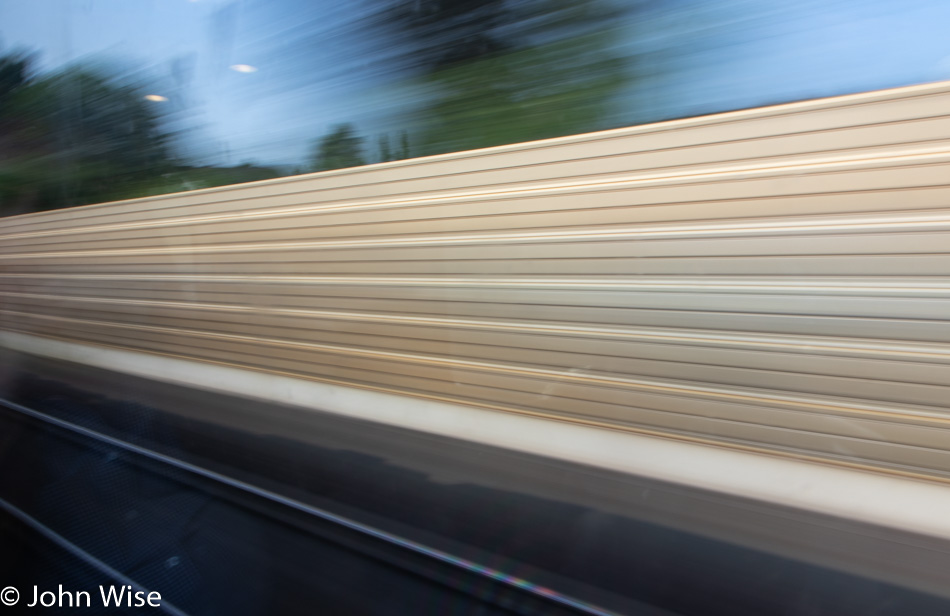
Trains, the economy, and the social fabric of our cultural constructs are all moving by in a blur, making them impossible to grab hold of and, consequently, to fully understand. The fragments I’m able to glean on my excursions are biased interpretations that flow through the filters of experience that have created my flavor of knowledge. My musings are like a train car that pulls into the station, loading up people, but in this case, impressions flood into my senses, which I carry forward like this speeding train going forward over the landscape. When it arrives at the next station, the view of the next location will come into view, and I will carry what I’ve collected and considered, applying those lessons to how I interpret the new impressions. The day my train comes to a permanent halt, I will have likely died, but until then, I should continue picking up new passengers, new thoughts, and new ideas.
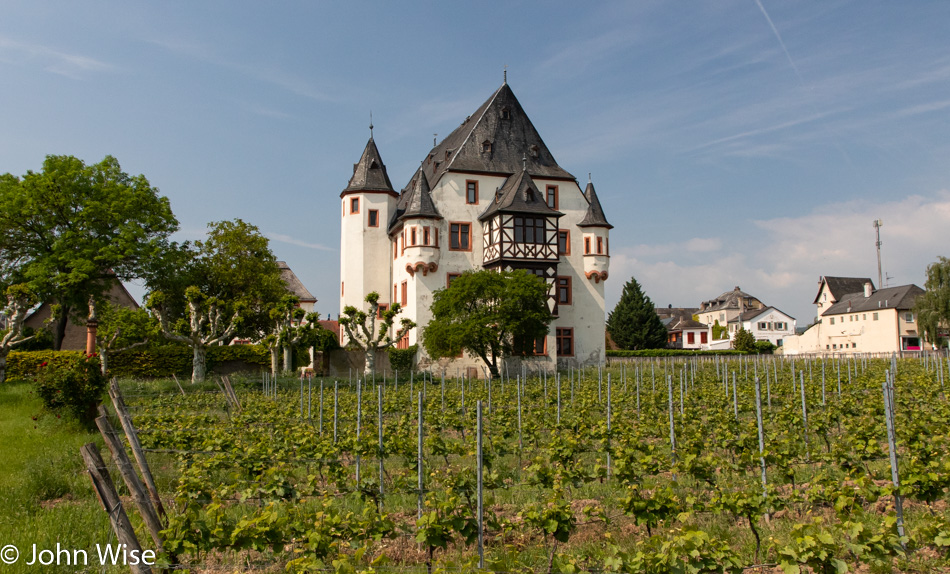
I know what you are thinking about now: “This doesn’t look like Geisenheim to me.” You are right; we are in Oestrich-Winkel, where we left the train about 6km before reaching our destination.

We traded 15 minutes of a train ride for 90 minutes of walking in order to better see our environment and move slowly among the impressions that should linger in our memories instead of joining the blur. It’s not every day that Caroline and I stroll past villas with vineyards on gently rising slopes that stretch up hillsides away from the river that makes this region a German treasure for cultivating grapes in the making of wine.
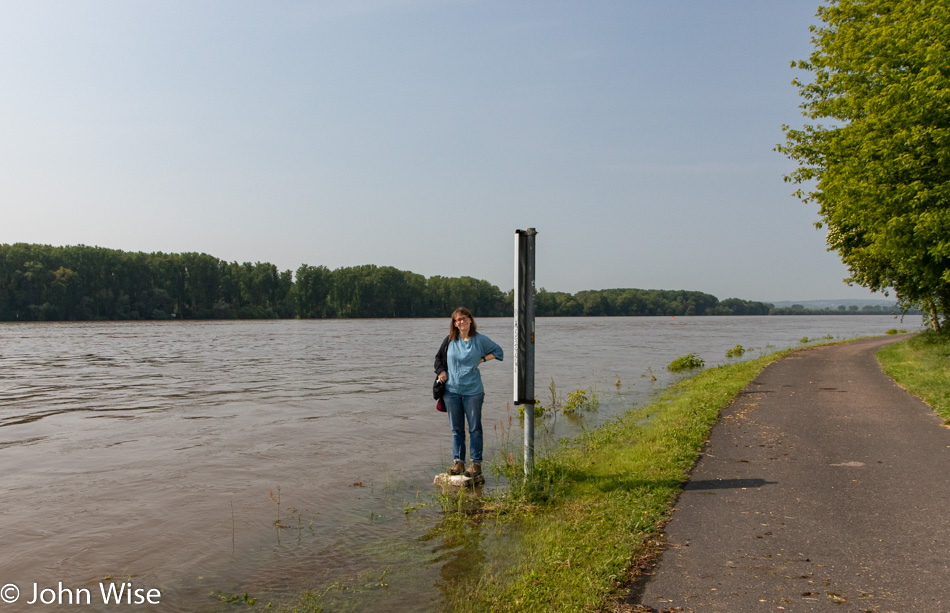
That river is the Rhine. From Switzerland flowing north through Germany into the Netherlands, this 1,230km (760 miles) river is second to the Danube in length regarding Central Europe but is a distant third when compared to the Volga at 3,530km. This highly navigable and vital waterway has spawned many a city along its banks, with a fair share of castles dotting outposts overlooking the lush and fertile lands that try to contain it. Today, the river is running high, and in some places, we have to detour as the trail is well underwater.
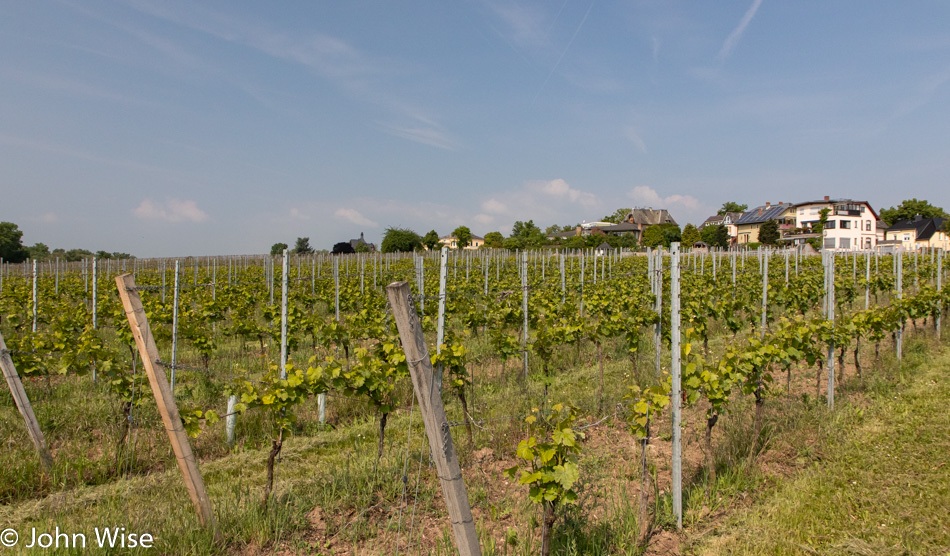
Our path is not a straight line as we zigzag from a flooded river path back towards a small town in the hopes of passing quaint storefronts or admiring a large vineyard that holds the promise of a wine that might become a classic.
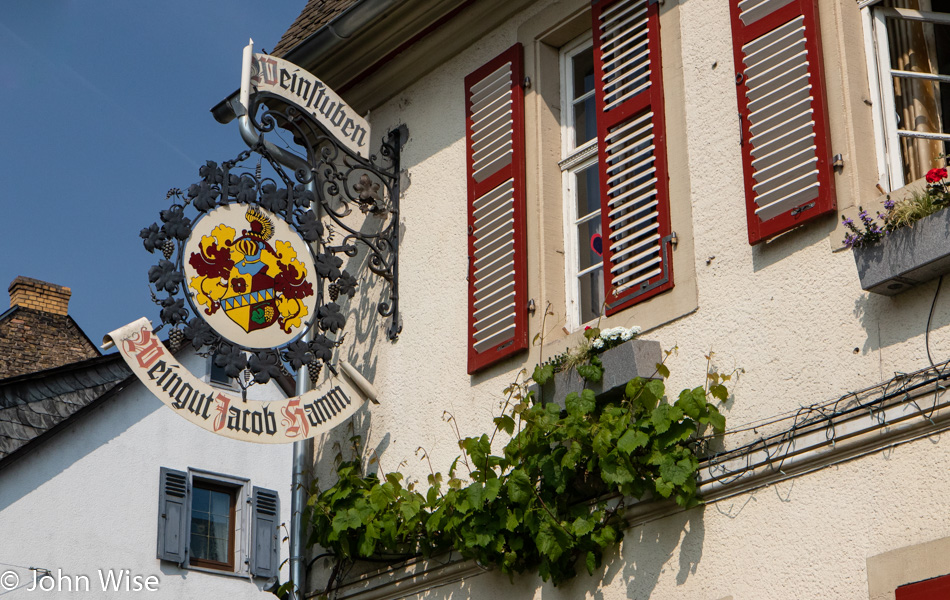
If you are going to walk by in the early morning, you might not always be able to dip into the places that hold appeal, and so it was as we passed Weingut Jacob Hamm here on the Hauptstrasse here in Oestrich-Winkel. Heck, they don’t even open until 18:00 today (6:00 p.m.), but their courtyard is pretty, and maybe one day we’ll wander back through for a 4-course dinner with wine pairing from their winery. Not that I’ll be sampling the wine, but that doesn’t mean that Caroline won’t be indulging.
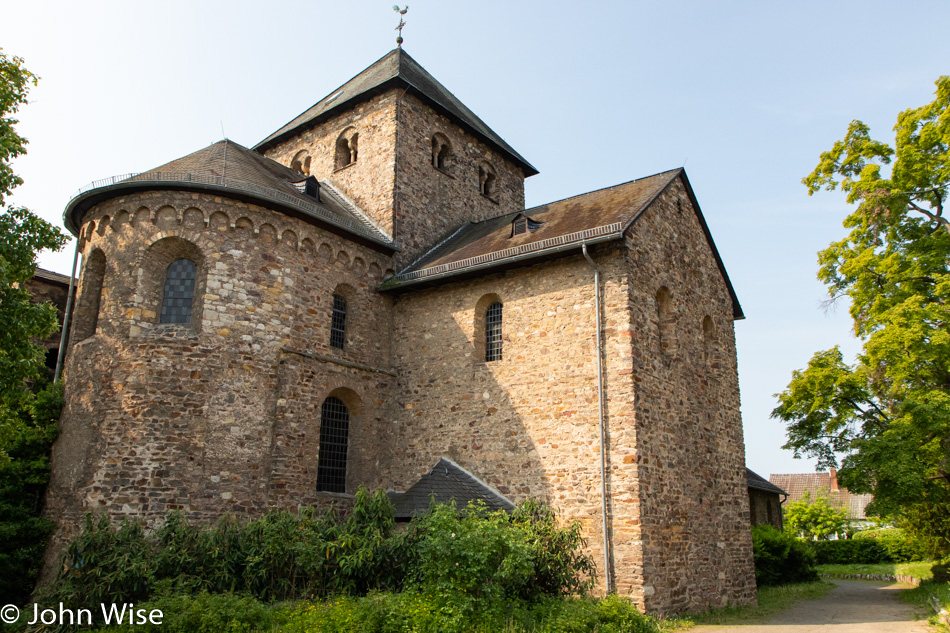
This is the Basilika St. Ägidius in Mittelheim of Rheingau. Wouldn’t you know it, the doors were locked this morning. Well, it’s been sitting here since the 12th century, so it’ll probably be waiting for us on a future visit where we better plan where our path takes us.
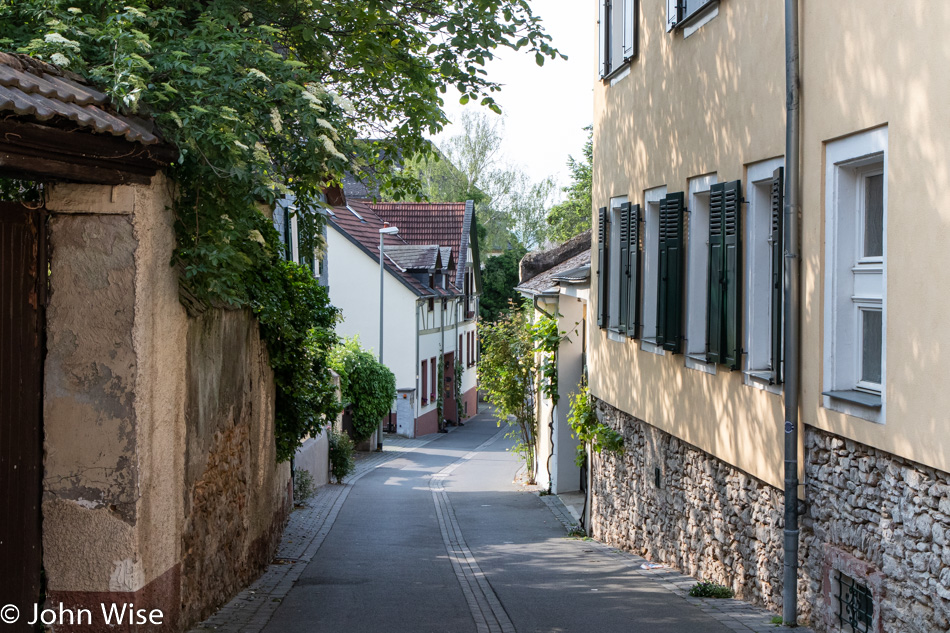
Every beautiful little village across the European landscape talks to us that this would be the perfect place to make a part of our retirement. Take, for example, this town; I’ve found rental properties for short-term stays from about $550 per month, which would certainly fit within our budget if our savings aren’t wiped out by some medical catastrophe. We will continue to dream and hope that one day we’ll be chilling next to some river and walking the hillsides while holding hands, still in love after a lifetime of exploring happiness.
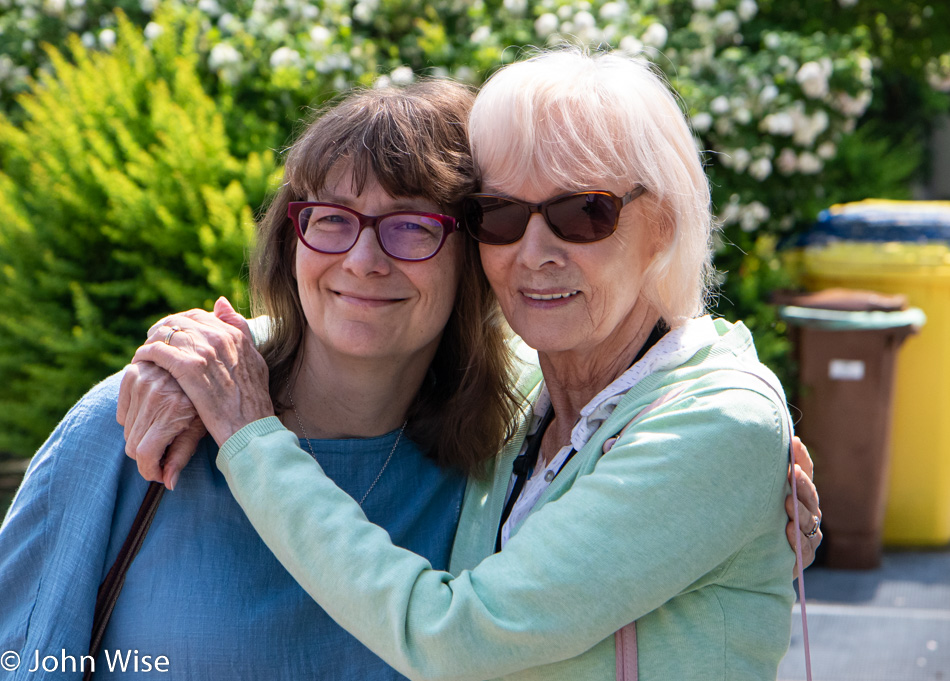
We’ve reached Geisenheim, where Caroline’s stepmother Vevie lives. Last year when we wanted to visit her she was over in Prague, so we missed her, this year we were able to spend half the day with her. Our visits with this shrinking family who are happy to see us are far too short, and so it will be today, too.
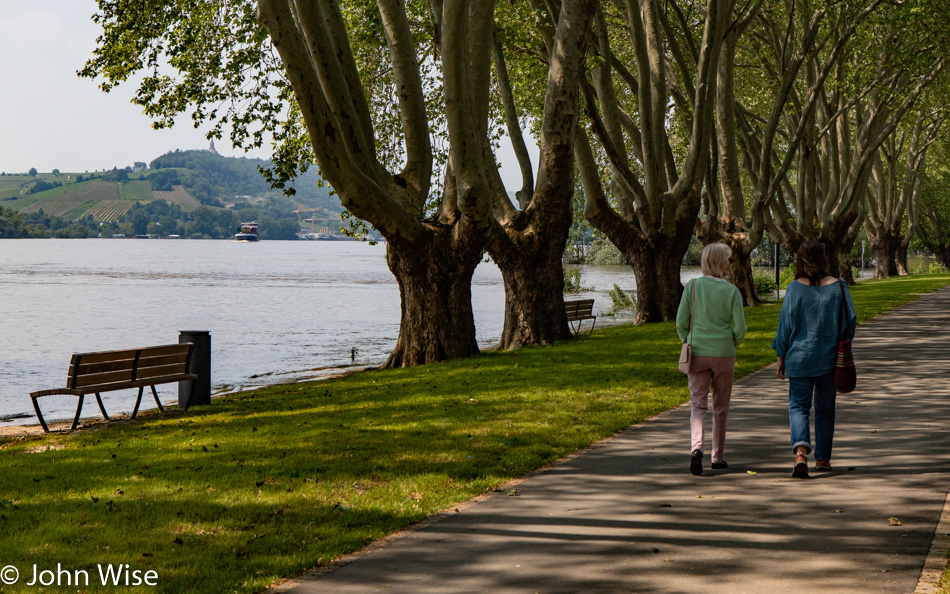
A short stop at Vevie’s home and a coffee later we were off to the Rhine for a leisurely riverside walk. Lunch will be had with Bingen in the background and the flooded river running swiftly past us here at the Bootshaus Restaurant. While Caroline and her stepmother enjoy a midday glass of wine, I’m here with the sparkling water and computer open to try and add something to the blog for the day.
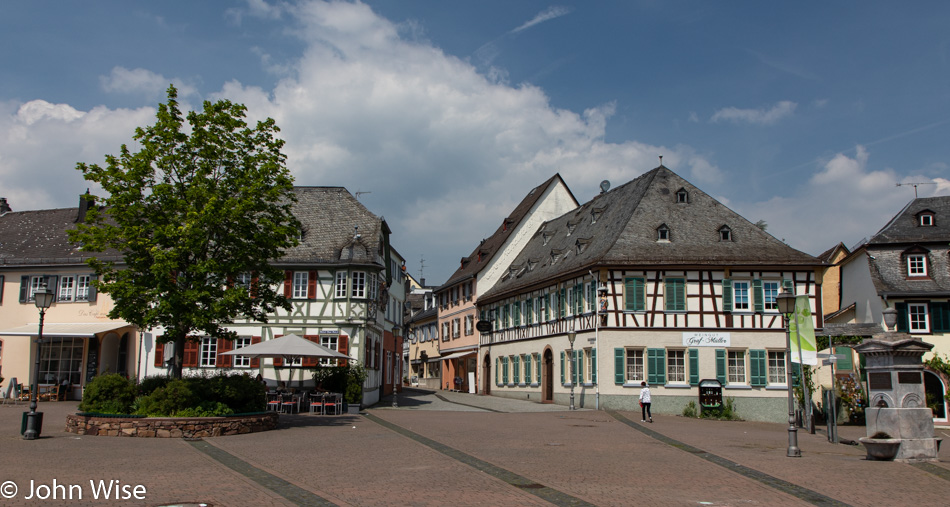
With Caroline and I together and the time spent with family, it’s rather difficult to find writing time, and she has even less time to give to editing my musings to ensure I don’t embarrass myself too much. The original plan, like yesterday’s, was that I’d make myself scarce while Caroline and Vevie met, and then I’d join them at a later time for lunch or a sweet. Instead, I find myself spending the afternoon with them. There’s a slight problem regarding my German language skills as the talk moves beyond the basics that deal with travel, and they explore details of daily life. This level of German is far beyond my ability to understand, and so being absent for at least part of the day would have let them converse without worrying about trying to include me, thus allowing the talk to be more spontaneous, but as things work out I’m ever-present, and they oblige me with the occasional translation so I’m not too far away from the conversation.
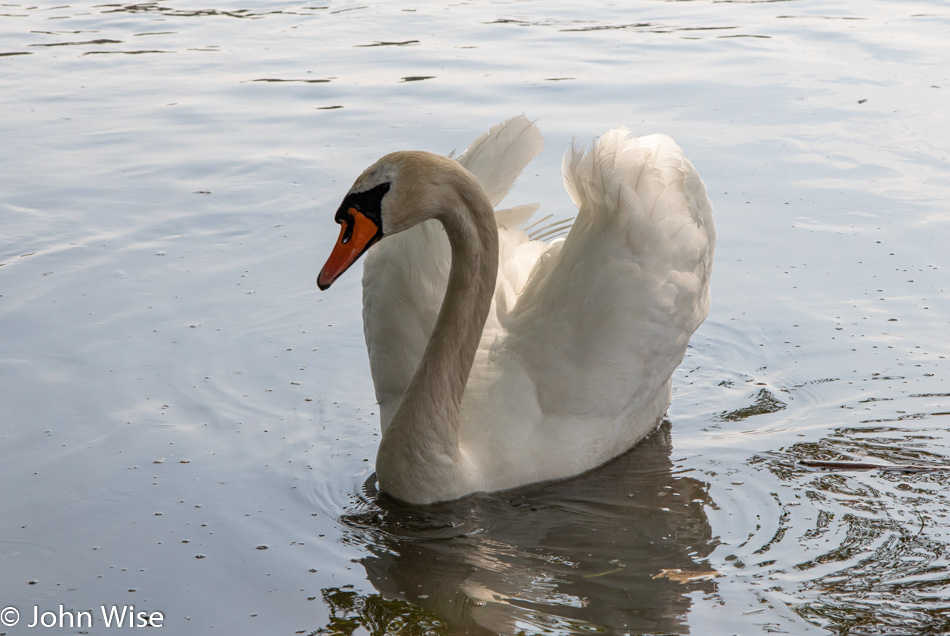
The section of the river we’re sitting next to draws in quite a few couples who take up a spot next to the water and sit awhile. A dozen or more barges have trundled by but only one private craft. There were a couple of dozen people setting up all manner of tents, food carts, and even a stage for this weekend’s festivities. The big event is called Besser als Nix or Better Than Nothing. With food, drink, and live music next to the Rhine, I know where I’d love to be, but if I’m not mistaken, this type of popup party is likely happening in hundreds of locations across Germany and then another thousand other places throughout Europe.
Just before leaving Vevie and Geisenheim, we had quite the surprise: Hanns Engelhardt. Turns out he didn’t know we’d be visiting Vevie today, and so after taking care of business in nearby Wiesbaden, he thought he’d drop in on her, but she wasn’t at home, so he waited for her return. What a surprise it was to see him a day early, so now you know who we’ll be traveling to see tomorrow. Unfortunately, we had to excuse ourselves as we still had arrangements to tend to later in the day, and so off we went.
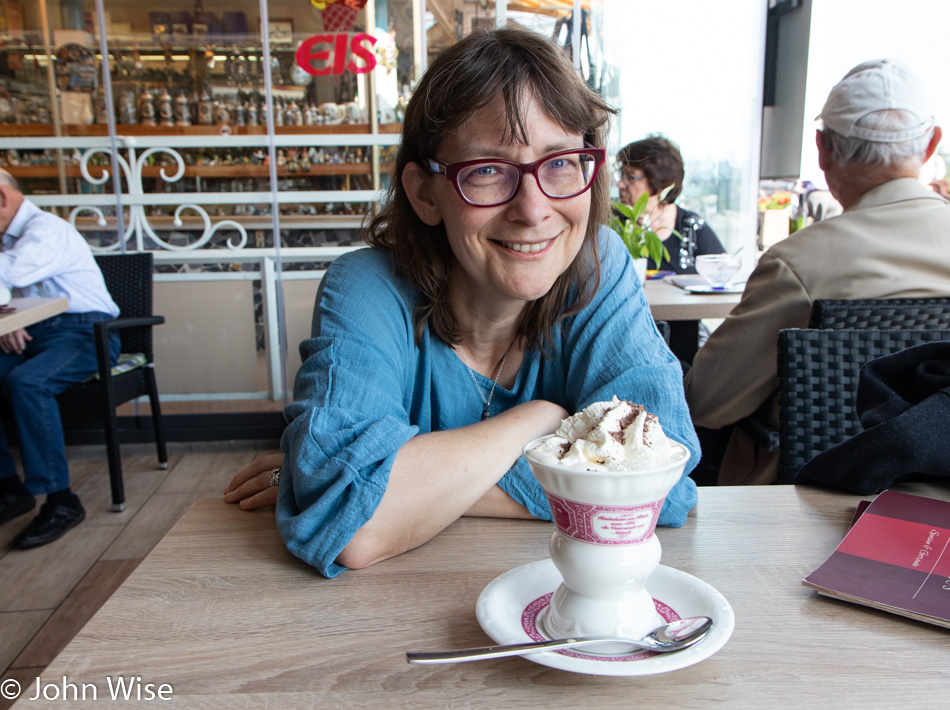
Should you wonder if I miss this type of lifestyle, the answer is unabashed: of course I do! So why are we not living in Europe? This celebration with beautiful weather is just getting underway as Germany emerges from six months of gray, cold weather and short days. If we could live anywhere here on the continent from June 1st until September 15th with a two-week return from the middle of December until after the New Year’s festivities, then we’d certainly opt for that. Cost of living is another difficult part of remaining in Europe for an extended period of time, with gasoline costing roughly $7 to $9 a gallon, rents in bigger cities starting at $1500 a month for something that would be about half the size of what we get in Arizona is also a factor.
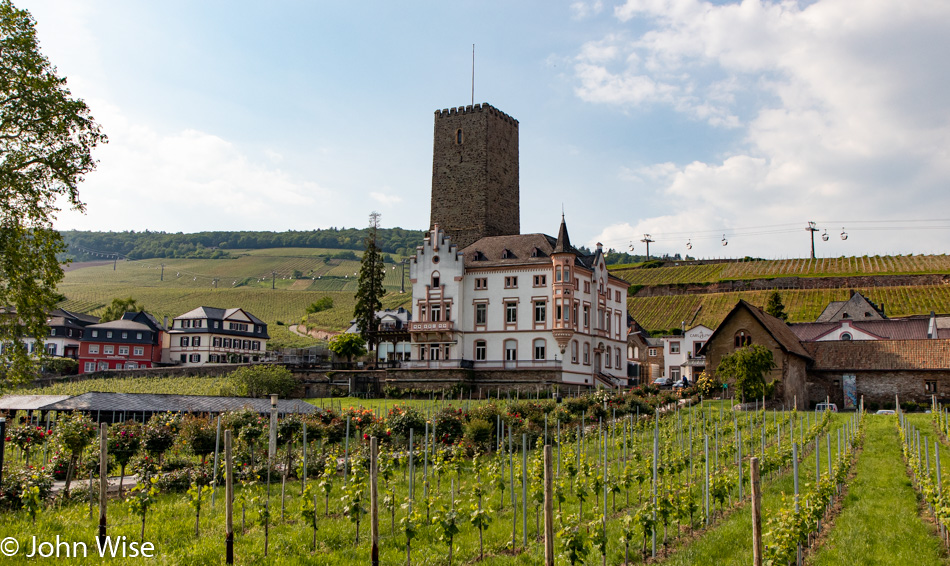
Maybe one day we’ll figure things out, and in retirement, we can live along the Oregon coast from October through early May and then make our way to Europe for the summer. While this would be a luxury to us, we’d have to do this economically, and as long as we can keep rents in both locations to under $1000 a month with electricity and water, it almost starts to seem possible. And you can trust that if we can find a rental property for only $650 a month a mile or two away from the ocean and then rent an Airbnb for a month at a time and stay in four different cities across Europe for about $30 a day, we’d be right on it.
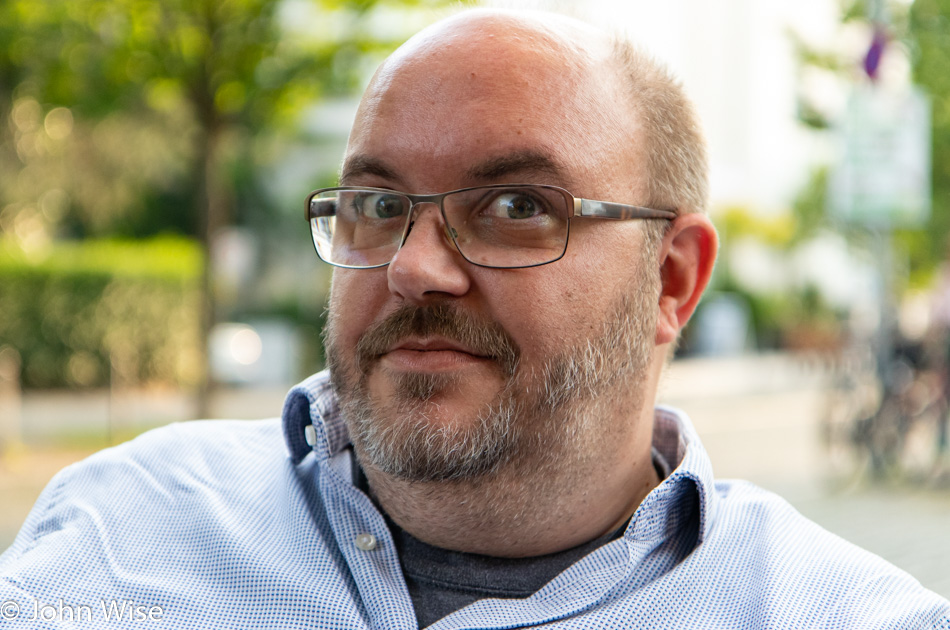
This is kind of extraordinary meeting up with an old friend twice on one trip, but that’s just what we’re doing tonight as we head to Harvey’s to check in with Olaf Finkbeiner and Torsten Kühne. These two leave indelible impressions on Caroline and me if for no other reason than their passion for being present and engaged in life has all of the rage and fire they had 30 years ago when we all met. To be honest, we know very few people who embrace life in quite the same way. Sure, we know successful people, ambitious people, and adventurous ones, too, but it’s rare for us to find two of the more intriguing qualities that are important to us, and those are political and intellectual engagement that borders on fervor. Not only are they actively working and concerned about the social conversation Europe is having, but both are creative forces that have refused to let their idealism take a rest.
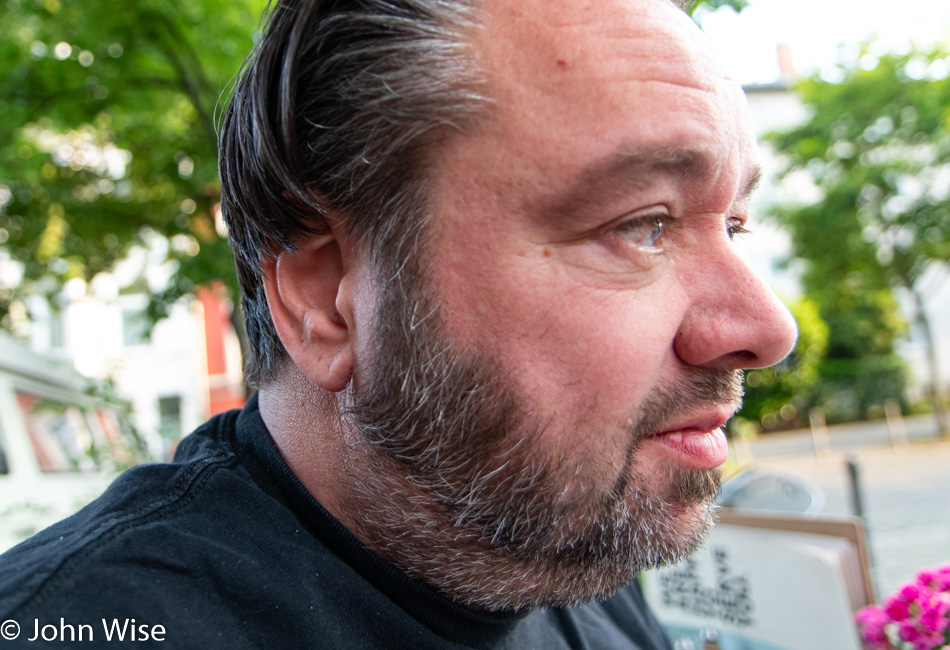
After drinks, hanging out, and talking a bit, hunger took over, and the guys suggested a different place to get dinner. We strolled down the street to Eckhaus. If anything makes us miss living in Europe, it is having these times with friends who’ve not betrayed their dreams to become characters that are poor representations of the people we knew when we lived around the corner from Olaf and To. Realistically, we’d probably see each other less if we were living in Frankfurt again, but that doesn’t diminish our fondness for having time to catch up with these two Menschen.